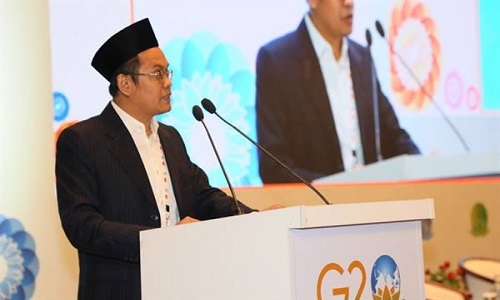Science aims to build sustainable, inclusive, equitable future with society: Prof Sharma
17 Jun 2023 11:53:04

Staff Reporter
President of Indian National Science Academy (INSA) Professor Ashutosh Sharma, presiding over the opening session on the first day of the two-day conference of Science-20 under G-20, said that the goal of science, together with the society, is to build a more sustainable, inclusive and equitable future. Professor Sharma said that science and culture are interrelated. Culture determines the direction and limits of scientific research. Society does the work of giving importance to scientific research. In the current global environment, exchange of ideas, mutual understanding and alertness to social interests are important for co-operative and common development in the future. Representatives of the scientific community from G-20 countries, invited states and international organisations attended the conference on the theme ‘Connecting Science to Society and Culture’ at Taj Hotel, Bhopal. Principal Secretary of Madhya Pradesh Science and Technology Department Nikunj Srivastava was present at the inauguration of the conference.
Professor Sharma mentioned about future challenges, environmental change, data inclusion, emergence of thinking machines etc. These challenges can be faced with global co-operation and activism of the society. He emphasised on the conservation of traditional knowledge of global cultures and their use in the development model. Development and universalisation of scientific thinking is essential for informed decision making. Globally, governments should make concerted efforts to promote scientific literacy. Efforts have to be promoted to motivate the next generation and provide opportunities to choose a career in the research field. Involve all components of society in scientific development: Prof Ahmed Najib Burhani: Professor Ahmad Najib Burhani from Indonesia called upon the global community to make efforts to increase the participation of all sections of the society, especially women, for inclusive scientific development. Professor Burhani said that traditional livelihood practices should be identified and appropriately used in the growth model for sustainable development. He mentioned the traditional ‘Sasi method’ of fish farming by preserving the medicinal plants of Indonesia, traditional agricultural method and marine ecosystems. During this, he also mentioned the idea of Mahatma Gandhi “Science without humanity is insignificant”. Professor Burhani underlined the historical ties and solidarity between India and Indonesia.
The representative of Brazil, Professor Ruben Olivan, said that development policies should be made considering social problems as the basis. Recognition of traditional knowledge is important. Professor Olivan mentioned the efforts being made in this direction in Brazil. Working together is the greatest strength of humanity: Dr Rajagopal Chidambaram: Padma Vibhushan awardee Dr Rajagopal Chidambaram in his opening talk on the theme of the conference said that it is the responsibility of the scientific community to make efforts for the eradication of social problems. The scientific community should strive for problem solving research. One should keep trying without waiting for the assurance of successful results. He said that the biggest strength of humanity is to work unitedly. Global community can get rid of community problems only through mutual co-operation. Professor Chidambaram referred to the C-Flows technology prepared in collaboration with IIT Bombay for flood forecasting and management at IIT Delhi and Chennai to assist the Divyang.
Two theme sessions have been organised on the first day of the conference. These focus on science and technology for education and skills, law and governance, heritage and culture. The discussions will mainly focus on Frontier Technologies, Future Society and Artificial Intelligence for Society and Culture. In these sessions, subject experts will present their views on different topics. It is noteworthy that Science-20 is a science engagement vertical of the G-20, which was established in 2017 during the presidency of Germany. It includes the scientific academies of all G-20 countries. The G-20, being organised under the chairmanship of India, has Indonesia and Brazil as Troika members along with India. The main objective of the Science-20 Engagement Group is to provide consensus-based science-driven recommendations based on consensus to policy makers.